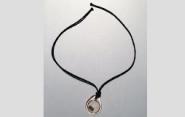CEID-Made Khushi Baby Advances Its Mission With Expanded Trials

The company behind a potentially life-saving device that originated at the Center for Engineering Innovation & Design (CEID) continues to expand at an impressive rate and move forward with its humanitarian mission.
 Khushi Baby has grown from five part-time members at the start of the year to nine full-time staff, five part-time staff, nine summer interns and a field team of more than 30 surveyors. And the company has begun its second randomized controlled trial in more than 600 villages in Udaipur, in western India. The trial will involve more than 30,000 mothers and children, tracking both child immunizations and maternal health outcomes. With data collected from surveys and the Khushi Baby system, the trial will provide information on what impact the company’s system has on health outcomes.
Khushi Baby has grown from five part-time members at the start of the year to nine full-time staff, five part-time staff, nine summer interns and a field team of more than 30 surveyors. And the company has begun its second randomized controlled trial in more than 600 villages in Udaipur, in western India. The trial will involve more than 30,000 mothers and children, tracking both child immunizations and maternal health outcomes. With data collected from surveys and the Khushi Baby system, the trial will provide information on what impact the company’s system has on health outcomes.
The Khushi Baby system includes a necklace with a computer chip inside that stores up to two years of vaccination records for young children. The system uses near field communication (NFC) technology to send and receive information through a smartphone. Data is synced to the cloud and displayed on a dashboard accessible to health officials. Even without a connection to a central database, health workers can scan the chip, see the health information and update it if needed.
The device was developed as part of the course "Appropriate Technology in the Developing World," designed to tackle ongoing global issues, which was co-taught by Dr. Joseph Zinter, assistant director of the CEID, and SEAS Lecturer Bo Hopkins.
The first trial, which began in 2015, showed that the system had a 98 percent retention rate, with only three of 141 mothers needing a replacement for the necklace. Ruchit Nagar '15, CEO and founder of Khushi Baby, noted that if a necklace is lost, the data is still backed up on tablets and on the cloud.
Crucial to the company's goals, the device is operable in even the most isolated communities, so health care workers in remote areas can have access to real-time data and make sure the children are up-to-date on their vaccinations. In some rural areas of India, parents must obtain and regularly update their children's vaccination records. Because health care workers can't verify that a child received a particular vaccination, it becomes a bigger problem if these records are lost.
One of the company’s major challenges is ensuring that health workers – stressed for time and resources - understand the importance of the information they’re recording. That requires extensive training with nurses in the villages on filling out forms completely and accurately.
“We want to make sure the data is looked at and acted on, and that the level of engagement grows,” said Nagar, now a student at Harvard Medical School. “They’re working hard, but not with good data – we want to give them good timely accurate data. With better quality data, we can deliver better quality care.”
Even as the company continues to operate on a relatively low budget, it’s bringing in new technologies to further improve the Khushi Baby platform. One goal is to incorporate the use of barcodes on vaccine vials. “We can use the barcode technology to save the specific vaccine vial’s information on the patient necklace,” Nagar said. “So if there’s an adverse reaction, they can trace it back to any vaccines that have gone bad or need to be assessed.”
Nagar said they also want use biometrics to ensure that the right person is administering the care and that the correct person is receiving the care. Biometric authentication, whether with facial or thumbprint recnognition, can help assure that this interface can be trusted.

